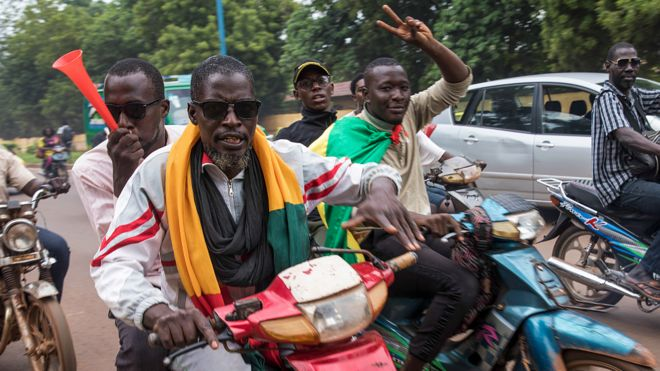
Mali's coup is cheered at home but upsets neighbours
Crowds rejoiced after a group of colonels seized power in Mali, a vast country stretching into the Sahara, where troops - including French soldiers and UN peacekeepers - are fighting jihadist groups, but not everyone is happy, writes West Africa analyst Paul Melly.
Negotiations are rumoured to be under way for the exile of Ibrahim Boubacar Keïta, deposed as president of Mali in a military putsch on Tuesday and currently detained with his son, his Prime Minister Boubou Cissé and a number of other senior government officials.
But now Ecowas, the West African regional bloc to which Mali belongs, has laid down a firm line, with member heads of state issuing a call for Mr Keïta's reinstatement as president.
The weary-sounding 75-year-old had announced his enforced resignation in a televised statement around midnight on Tuesday, apparently from a room at the Kati army base, 15km (nine miles) from Bamako, where he and Mr Cissé had been taken by soldiers that afternoon.
This came after more than two months of confrontation with an alliance of opposition politicians and civil society, the M5-RFP, in whose name massive crowds staged a series of street demonstrations shrewdly piloted by the charismatic imam Mahmoud Dicko.
Protesters had only one central demand - Mr Keïta's resignation, although Mr Dicko held back from explicitly calling for this himself.
In negotiations mediated by Ecowas, Mr Keïta had made concession after concession, but never ceding either his own position or the decisive reforms that would have clearly ended his command of the state machine.
That was no longer enough and finally a group of senior - but not top-ranking - officers, moved to end his occupation of the presidency.
But Ecowas is not prepared to go along with this unconstitutional change of power and its envoy, former Nigerian President Goodluck Jonathan, is soon expected back in Bamako to talk to the putchists.
Difficult negotiations lie ahead and no-one can be sure how they will pan out.
